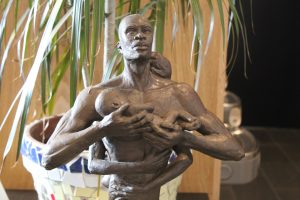
Odette and Albert Jefferie sitting on their front porch, enjoying a sunny day in Jackson Ward. (Photos by Fatema Al Darii)
By Fatema Al Darii
The Black History Museum (BHM) on West Leigh Street, in the heart of Jackson Ward, is one of the many symbols that showcase both the history and current dynamics of the neighborhood.
On the museum’s glass doors, their hours of operation are printed in a white font; a nearby sign bears witness to the building’s original purpose, as “the nation’s only 19th century armory built for an African-American militia.” Inside, interactive touch screens display teachings about black history, artwork and sculpture.
The museum was empty, but the emptiness was deceptive. “We’re holding an event today for the Boys and Girls Club,” said a museum staff member, looking a bit anxious. “It’s our first time hosting them.” From my own volunteer work, I know a little about the Boys and Girls Clubs, who provide safe and creative environments for young students.
On a reception table in the lobby stands a beautiful sculpture: an African man holding a infant in his arms, embraced from behind by a woman. A sign under the sculpture identifies it as “The Bond,” by local artist Brian Owens.
I thought of that sculpture later, as I talked with Odette and Albert Jefferie. They were enjoying the sunny afternoon on their porch as I walked by. Friendly and curious, they invited me to come up and sit with them.
We chatted for a few minutes, introducing ourselves, and they asked me about my home country, Oman.
Odette glanced at her car, which was parked out front. “I need to move it,” she said, ducking inside to fetch the car keys. “I don’t trust him to park it,” she giggled, motioning at Albert as she walked to the car.
A young lady in a pink shirt came out of the house, looking for a jacket to protect her from the cold wind. She was shy, and took a step back when she noticed my presence. Then she smiled, and all was well. “This is our daughter,” Odette said, as she went inside to help her.
The couple have three children, said Albert. Two of them live here.
I asked them about living in Jackson Ward. “It’s more open to us,” Albert said. It’s a tight-knit community, and they like that. “We’ve been around here for 20 years and we know the same people.”
An ordinary day for the Jeffries is “laid back, with lots of traffic.” On Sundays, young and old play basketball on the court across the street or just hang out, drinking beer.
There is a bond here, between the Jeffries. And another between them and their community. They don’t make a big deal out of it, but the bond is strong.

